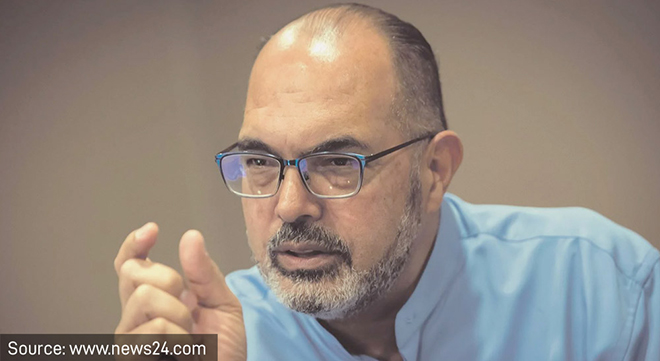The South African Revenue Service (SARS) achieved unexpected milestones in tax collection in the fiscal year that ended on 31 March, surpassing initial estimates while cracking down on fraud and non-compliance.
The tax-collecting authority on Tuesday announced its preliminary statistics for the 2023/24 fiscal year.
Commissioner Edward Kieswetter (pictured) said SARS collected gross tax (before refunds) of R2.155 trillion. This represented a 4.2% increase from the previous year, albeit slightly slower than nominal economic growth.
The net collection was R1.741 trillion, outpacing National Treasury’s February estimate by R10 billion, and 3.2% higher than the R1.687 trillion in 2022/23.
The higher-than-anticipated income means the budget deficit as a percentage of gross domestic product for the 2023/24 fiscal year could be better than Treasury’s February projection of 4.9%.
Personal income tax (PIT) and value-added tax were key contributors to the record tax collection, at 37% and 26%, respectively.
Gross PIT collections rose by 8.3%, reaching R692bn (2022/23: R634bn), buoyed by average salary hikes of 6.3% and substantial bonuses in the financial sector. Net PIT revenue was up by 8.2% to R651bn (R602bn).
Gross VAT receipts grew by 6.6% to R791bn (R741bn), signifying consumer spending resilience despite economic headwinds. Net revenue increased by 6%, amounting to R448bn (R422bn).
However, corporate income tax (CIT) experienced a gross decline of 7.2% to R340bn (R367bn). This downturn primarily stemmed from diminished tax contributions from the mining sector, which shrank by R42bn because of plummeting commodity prices.
Net CIT collections were 8.9% lower than in 2022/23 at R317bn (R348bn).
The fiscal year saw a record R413.8bn in refunds, an increase of 8.6%.
PIT refunds increased by 10.3% to R40.4bn. VAT refunds rose by 7.5% to R343bn, with R120bn paid to small and medium-sized entities and R37bn to individuals. CIT refunds jumped by 22.8% to R23bn.
New renewable energy players injected R2bn into the fiscus, reflecting a return on VAT refunds typically claimed during the initial investment phases.
The fuel levy contributed gross revenue of R98.8bn, up 13% from R87bn. Net revenue from the levy came in at R91.5bn.
Net collections from other taxes were:
- Import duties: R70.6bn, down 4.5% from R73.9bn.
- Specific excise duties: R53.5bn, down 3.1% from R55.2bn.
- Dividends tax: R39.1bn, up 2.6% from R38.1bn.
- Property taxes: R19.4bn, down 8.6% from R21.2bn.
- Other taxes and duties: R50.5bn, up 10.9% from R45.6bn.
The fiscal year also witnessed an expansion in taxpayer registrations, with 1.1 million new individuals and 40 000 new employers joining the tax register. These additions brought the total number of individuals and trusts to 28 million, while 650 000 employers are now on the tax register.
Clampdown on non-compliance
SARS’s enforcement drive included various initiatives targeting tax evasion and fraudulent activities. SARS secured an 84% victory rate in 110 court judgments, and criminal investigations resulted in a 95% conviction rate, culminating in total prison terms of 49 years.
Clampdowns on fraud and “wilful” non-compliance netted R293.7bn, 27% more than in the previous year. Of this, R101bn came from preventing fraudulent VAT refunds.
Other sources of this revenue boost included:
- 3bn from debt collections;
- 9bn from customs and excise compliance;
- 1bn from investigations into criminal activities;
- 3bn from the identification of 28 000 individuals who paid too little provisional tax; and
- 5bn from 1 400 voluntary disclosures.
Kieswetter warned taxpayers to ensure they do not receive bad tax advice from tax practitioners who are themselves non-compliant.
“We’ve identified 53 tax practitioners who remain non-compliant in their own taxes, which explains, in part, how they advise their clients and why their clients are equally delinquent,” he said.
In one law firm alone, in Sandton, SARS found 14 partners who underestimated their own provisional taxes.
SARS has started the process of revoking the licences of non-compliant practitioners. Eight licences have been revoked, and criminal investigations are under way against others found to be in breach of their tax obligations.
“We’ve stepped up our vigilance when receiving approval requests for international transfer via practitioners, and many of these have resulted in full audits,” Kieswetter said.
SARS is also increasing its monitoring of South Africa’s 64 000 tax-exempt institutions, particularly public benefit organisations. Tax revenue from these organisations increased by almost 9% to R16.5bn in 2023/24. SARS disallowed R1bn of impermissible claims, presented as donations.
Kieswetter said SARS is concerned about the levels of tax abuse and low compliance among tax-exempt non-profit and non-governmental organisations, some of which are being used as vehicles for money laundering and tax crime.
Some 4 000 taxpayers are now managed by SARS’s High Wealth Individuals Unit, and another 58 000 taxpayers and their related entities will be migrated to the unit over time.
Over the past year, as part of their foreign investment allowances, high net worth individuals applied to move R13.6bn overseas (2022/23: R17bn). Some R7bn was approved.



